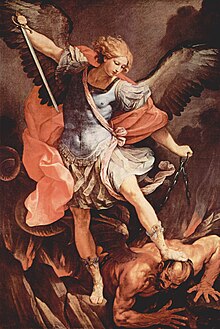Es erhub sich ein Streit, BWV 19
|
Es erhub sich ein Streit BWV 19 |
|
|---|---|
| Church cantata by J. S. Bach | |

|
|
| Occasion | Feast of Saint Michael |
| Performed | 29 September 1726: Leipzig |
| Movements | 7 |
| Cantata text | Picander |
| Chorale | by Christoph Demantius |
| Vocal |
|
| Instrumental |
|
Es erhub sich ein Streit (There arose a war), BWV 19, is a church cantata by Johann Sebastian Bach. He composed it in Leipzig in 1726 for the Feast of Saint Michael and first performed it on 29 September 1726.
The prescribed readings for the Sunday were from the Book of Revelation, Michael fighting the dragon (), and from the Gospel of Matthew, heaven belongs to the children, the angels see the face of God (). The text of the cantata was written by Christian Friedrich Henrici, better known as Picander, who includes as the closing chorale a stanza from a hymn by Christoph Demantius.
The chorale theme is Freu dich sehr, o meine Seele, which was codified by Louis Bourgeois when setting the Geneva Psalm 42 in his collection of Pseaumes octante trios de David (Geneva, 1551). Bourgeois seems to have been influenced by the secular song "Ne l'oseray je dire" contained in the Manuscrit de Bayeux published around 1510.
The piece is scored for three vocal soloists (soprano, tenor, and bass) and four-part choir, three trumpets, timpani, two oboes, oboe da caccia, two oboes d'amore, two violins, viola, and basso continuo. Traditionally in Leipzig during Bach's time the Feast of St Michael celebrations used the largest orchestra available. All known complete Bach cantatas for this occasion include trumpet and timpani.
...
Wikipedia
